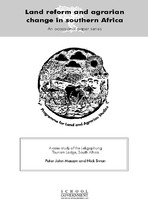A case-study of the lekgophung tourism lodge, South Africa
Abstract
The Lekgophung Lodge is a community-owned wildlife tourism lodge, located in the western part of the Madikwe Game Reserve in the North West Province of South Africa. The Lekgophung community is settled near the western boundary of this protected area. The key case-study question is: How and how much can community-owned lodge development within a protected wildlife area contribute towards sustainably improving livelihoods of households in communities bordering on the protected area? The study considers the following aspects: structural arrangements; funding; financial returns and ‘SMME’ (small, medium and micro enterprise) linkages; employment opportunities; skills acquisition and institution building; lodge governance; and development co-ordination.
Direct benefits from the Lekgophung Lodge enterprise are expected to boost average household income in the village by about R3 150 per annum and overall disposable income by more than 26%. The rights and benefits to the Lekgophung community through the lodge are durably secured through a range of mechanisms including long-term lease rights, partnership contracts with private lodge operators, who are required to pay a fixed fee and a percentage of turnover to the community and participation by the community in a multi-stakeholder park-based development steering committee.
The lodge is well-integrated with park and local government development initiatives. Although still in the construction phase, the lodge has added value at many levels. The project brings substantial economic benefits and works within the ënewí cost recovery paradigm of protected area management.
However, the lodge remains dependent on a capital subsidy and private expertise mobilised via partnerships with the public and private sectors. In taking up lodge governance functions, the Trust and Lekgophung community could benefit from having tools and processes to assess the impact of the lodge on local livelihoods, and to monitor asset and livelihoods trends.

